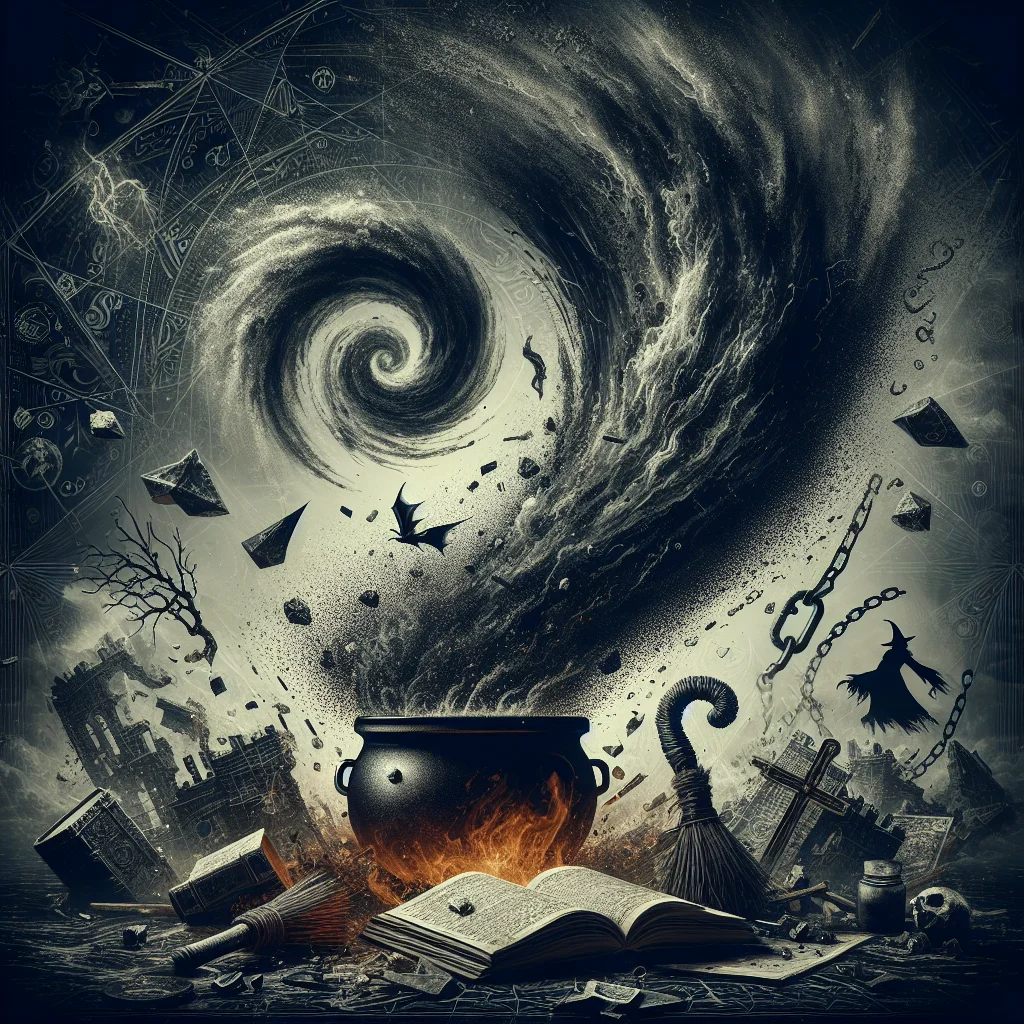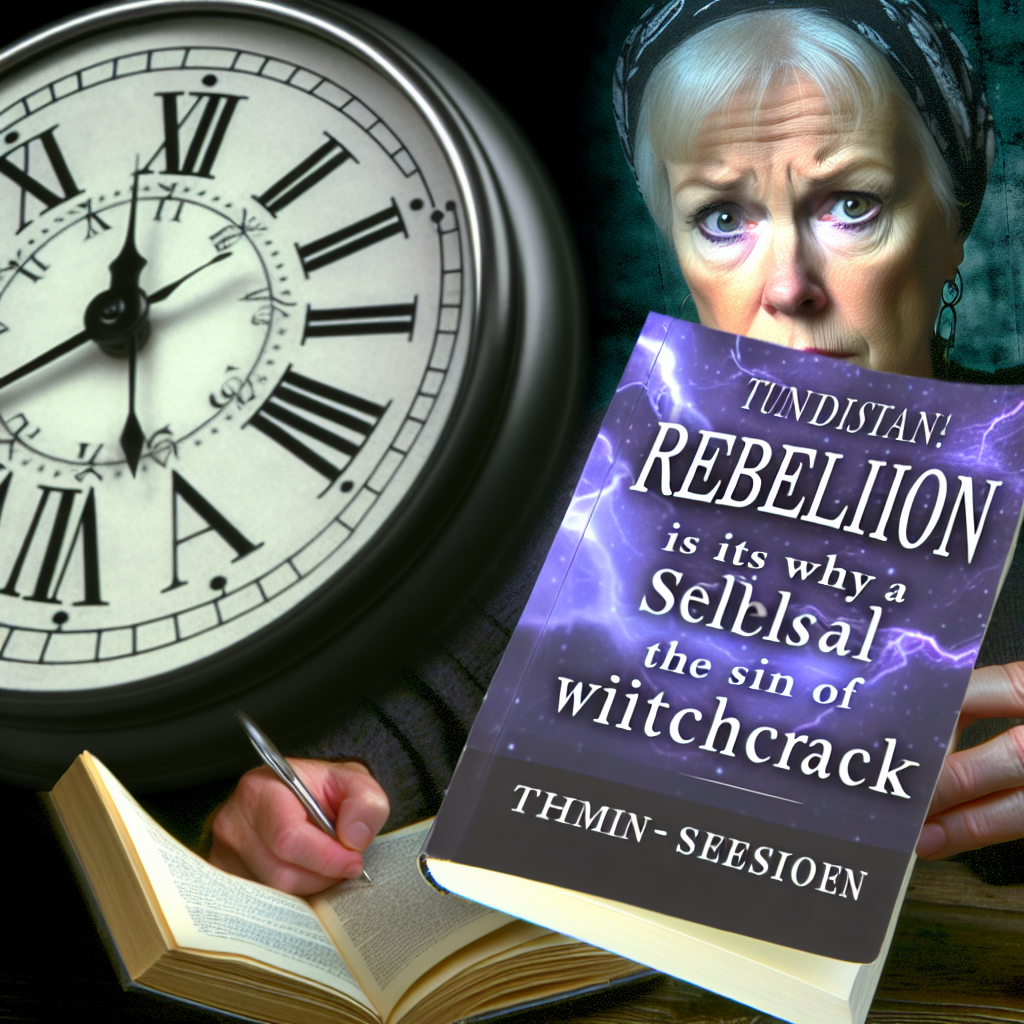As an Amazon Associate I earn from qualifying purchases.
Time-Sensitive: Understand Why Rebellion Is As the Sin of Witchcraft is a thought-provoking concept that delves into the intriguing connection between rebellion and witchcraft. Defined as an act of defiance against authority or established norms, rebellion has long been viewed in a negative light. Its historical significance can be traced back to several instances of rebellious behavior throughout various societies and cultures.
Rebellion, often associated with rebellion against earthly authority, has been considered as grave as the sin of witchcraft. This comparison stems from the belief that both acts involve a rejection or defiance of God-given order and principles. The concept of rebellion as a sin finds its roots in biblical teachings, where rebellion is seen as a manifestation of pride and a refusal to submit to God's ultimate authority.
Throughout history, numerous rebellious movements and individuals have emerged, challenging the status quo and advocating for change. From political revolutions to social movements, rebellion has played a pivotal role in shaping societies. However, it is important to note that not all acts of rebellion are inherently negative. Many revolutions have been catalysts for positive change, highlighting the complexity and nuances surrounding this topic.
In the present day, rebellion takes various forms, both subtle and overt. The rise of social media has given individuals a platform to express their dissent and challenge traditional beliefs and institutions. This newfound ability to rebel against authority has resulted in a societal shift, where resistance can be shared with a worldwide audience. Additionally, the consequences of rebellion have become more immediate and far-reaching as society becomes increasingly interconnected.
One engaging element to consider is the alarming statistic that rebellion and its consequences continue to permeate our daily lives. From political uprisings to protests against injustice, rebellion remains an ongoing struggle in societies worldwide. This statistic underlines the continued significance and relevance of understanding the connection between rebellion and witchcraft, as both acts threaten established orders and challenge societal norms.
In conclusion, Time-Sensitive: Understand Why Rebellion Is As the Sin of Witchcraft sheds light on the complex and intriguing relationship between rebellion and witchcraft. By exploring the historical significance and current implications of this connection, we gain a deeper understanding of the transformative power of rebellion. Whether viewed as a sin or a catalyst for positive change, rebellion continues to shape our world, demanding further examination and exploration.
Why is rebellion considered as sinful as witchcraft? Revealing the untold connection
In this article, we delve into the intriguing link between rebellion and witchcraft and explore why they are deemed equally sinful. By examining the definitions and implications associated with both rebellion and witchcraft, we uncover the hidden relationship that raises thought-provoking questions about morality and disobedience. Join us in the next section to delve deeper into this captivating topic and gain a comprehensive understanding of why rebellion holds such a significant resemblance to the sin of witchcraft.
u003ch2u003eUnderstanding Why Rebellion Is As the Sin of Witchcraftu003c/h2u003e
u003cpu003eRebellion is a complex and multifaceted concept that has been a subject of deep contemplation throughout history. In religious contexts, rebellion is often regarded as a grave sin, likened to witchcraft. This analogy between rebellion and witchcraft is rooted in a belief that both actions disrupt divine order and challenge authority. Understanding why rebellion is seen as the sin of witchcraft requires delving into the inherent characteristics of rebellion and its perceived negative effects on society and spirituality.u003c/pu003e
u003ch2u003eRebellion and Divine Orderu003c/h2u003e
u003cpu003eIn religious belief systems, divine order is a fundamental principle that establishes a hierarchy and provides structure to society. Rebellion, in this context, is viewed as a direct violation of this divine order, disrupting the harmony intended by a higher power. Just like witchcraft is seen as an act of defiance against God's authority, rebellion is seen as a rebellion against the natural order established by the divine. The belief is that individuals who rebel are challenging the very foundation of spiritual and societal stability.u003c/pu003e
u003ch2u003eRebellion and Authorityu003c/h2u003e
u003cpu003eAuthority plays a crucial role in the perception of rebellion as a sin akin to witchcraft. Rebellion is often seen as a refusal to submit to legitimate authority, be it religious, political, or social. The analogy to witchcraft comes from the notion that both rebellion and witchcraft involve going against the established order and challenging those in power. In religious contexts, God's authority is supreme, and any rebellion is seen as an attempt to undermine or overthrow this authority, similar to what witchcraft is believed to do.u003c/pu003e
u003ch2u003eRebellion and Social Disruptionu003c/h2u003e
u003cpu003eRebellion is not solely confined to religious or spiritual contexts but also has implications for broader societal dynamics. Historically, rebellions have often been associated with social unrest, upheaval, and a destabilization of the status quo. This disruption of social order parallels the perceived disruptive effects of witchcraft. The analogy between rebellion and witchcraft is thus reinforced by the notion that both actions can have wide-ranging consequences that go beyond individual actions, affecting the fabric of society as a whole.u003c/pu003e
u003ch2u003eImplications and Statisticsu003c/h2u003e
u003cpu003eThe association of rebellion as the sin of witchcraft holds significant implications for how societies and religious communities approach acts of defiance. It often leads to a strict condemnation of rebellious behavior and the enforcement of rigid conformity to maintain order and stability. This perspective can limit opportunities for progress and change, stifling individual agency and creative thinking. However, it is important to note that statistics on the prevalence of this belief or the direct impact on societal dynamics are challenging to ascertain. Nevertheless, the persistence of this analogy throughout history reflects the profound influence it has had on shaping societal norms and religious doctrine relating to rebellion.u003c/pu003e
FAQs – Rebellion is as the Sin of Witchcraft
1. What does the phrase “Rebellion is as the Sin of Witchcraft” mean?
The phrase implies that rebellion against authority is considered as sinful and evil as practicing witchcraft.
2. Is witchcraft really considered a sin?
Yes, according to many religious belief systems, practicing witchcraft is often seen as a sinful act.
3. Why is rebellion compared to witchcraft?
The comparison is made to highlight the seriousness of rebellion. It suggests that just like witchcraft, rebellion is morally wrong and goes against the teachings of many religions.
4. What constitutes rebellion in this context?
In this context, rebellion refers to defying or disobeying legitimate authority, such as a government, religious leaders, or other established institutions.
5. Why is rebellion considered a sin?
Rebellion is considered a sin because it undermines the stability, order, and established hierarchies that are essential for a functional society or community.
6. Are there any biblical references to support the statement?
Yes, the statement “Rebellion is as the Sin of Witchcraft” is derived from the Bible, specifically from the book of 1 Samuel 15:23, where Samuel rebukes King Saul for his disobedience.
7. What are the consequences of rebellion?
Rebellion can have various consequences, such as strained relationships, loss of trust, legal repercussions, and societal unrest. It can also have spiritual consequences, depending on one's religious beliefs.
8. How does this concept relate to societal norms and laws?
This concept suggests that obedience to societal norms and laws is crucial for maintaining order and stability in a community. Rebellion against these norms and laws is seen as harmful and morally wrong.
9. Can rebellion ever be justified?
Situational ethics and personal beliefs may lead individuals to justify certain acts of rebellion under specific circumstances. However, from a general moral standpoint, rebellion is typically not considered justified.
10. How can one avoid rebellion?
Avoiding rebellion involves respecting and abiding by legitimate authority, seeking peaceful resolutions to conflicts, and engaging in open communication. Understanding the consequences of rebellion can also help deter individuals from rebelling.

Conclusion:
The concept of rebellion being equated to the sin of witchcraft sheds light on the dangerous ramifications of disobedience and defiance. This article has explored how rebellion, in its essence, involves a rejection of authority and an act of self-will. It has highlighted the biblical basis for this comparison, drawing from scriptures that emphasize the importance of submission and obedience to God's appointed leaders. By viewing rebellion through the lens of witchcraft, a link is established between the subtle deception and manipulation involved in both acts, emphasizing their destructive nature and the potential harm they can inflict on individuals and society as a whole.
Furthermore, the article has examined the consequences of rebellion, addressing its impact on relationships, particularly within families and communities. It emphasized that rebellion fractures unity and disrupts the order that God has set in place. The parallel drawn between rebellion and witchcraft underscores the spiritual dimension of this sin, emphasizing the spiritual warfare that accompanies acts of rebellion. By understanding rebellion as a sin of witchcraft, the article emphasizes the need for individuals to recognize the gravity of their actions and seek repentance and redemption. It serves as a reminder of the importance of humility, submission, and obedience in one's spiritual journey, ultimately leading to harmony and spiritual growth.
Amazon and the Amazon logo are trademarks of Amazon.com, Inc, or its affiliates.


